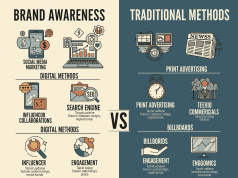In today’s rapidly evolving digital landscape, consumers are inundated with content, advertisements, and marketing messages vying for their attention. Amidst this noise, personalization has emerged as a powerful strategy that not only captures audience engagement but also drives meaningful results. Companies leveraging advanced marketing technologies that personalize customer interactions are not only winning hearts but also boosting their bottom lines.
Understanding Personalization in Marketing
Personalization goes beyond simply addressing customers by their first names in emails. It involves tailoring marketing messages and experiences based on individual behaviors, preferences, and interactions. By harnessing data from various touchpoints—such as social media interactions, browsing history, and past purchases—businesses can create highly targeted campaigns that resonate with specific segments of their audience.
Key components of personalization include:
- Segmentation: Dividing a customer base into specific groups based on traits like demographics, buying behavior, or preferences.
- Dynamic Content: Using algorithms to serve customized content that caters to individual user preferences in real-time.
- Predictive Analytics: Employing machine learning to anticipate customer needs and deliver recommendations proactively.
The Role of Marketing Technology in Personalization
Advancements in marketing technology (martech) have made personalization more attainable than ever. Here are some pivotal technologies that are driving the personalization revolution:
1. Customer Relationship Management (CRM) Systems
Modern CRM platforms, such as Salesforce and HubSpot, allow businesses to collect and analyze customer data comprehensively. By maintaining a 360-degree view of the customer, companies can tailor their interactions and communications effectively.
2. Marketing Automation Tools
Platforms like Marketo and Mailchimp enable businesses to automate campaigns based on user behavior. For instance, when a customer abandons a cart, an automated follow-up email can be triggered to remind them of the products left behind, often accompanied by a targeted discount.
3. Data Analytics & Insights
Tools like Google Analytics and Tableau provide valuable insights into customer behavior and preferences. With real-time data analysis, businesses can adjust their strategies swiftly, ensuring that the content remains relevant and personalized.
4. Artificial Intelligence (AI)
AI plays a crucial role in enhancing personalization. By analyzing vast amounts of data, AI algorithms can detect patterns, forecast trends, and recommend products that align with individual customer preferences, thereby optimizing the user experience.
5. Content Management Systems (CMS)
Advanced CMS platforms allow for dynamic content delivery. By creating segments within the user base and delivering tailored content experiences, brands can significantly enhance user engagement and satisfaction.
Benefits of Personalization
The benefits of personalization in marketing extend far beyond customer satisfaction. Here are some compelling reasons companies are investing in personalized marketing strategies:
1. Improved Customer Engagement
Personalized messages capture attention more effectively than generic communications. Brands that personalize their outreach see higher open rates, click-through rates, and engagement metrics.
2. Enhanced Customer Loyalty
Consumers are more likely to remain loyal to a brand that understands their preferences and caters to their needs. Personalization fosters a sense of connection, leading to repeat purchases and long-term customer relationships.
3. Increased Conversion Rates
When customers receive tailored product recommendations that align with their interests, they are more inclined to make a purchase. Personalization significantly boosts conversion rates, driving revenue growth.
4. Improved ROI
Personalized marketing efforts yield a higher return on investment. According to studies, personalized marketing can lead to a substantial increase in sales—often reported as significantly higher compared to traditional marketing strategies.
Challenges in Implementing Personalization
Despite the clear benefits, many organizations face challenges in deploying effective personalization strategies:
- Data Privacy Concerns: As data regulations like GDPR become stricter, businesses must navigate privacy concerns while still delivering personalized experiences.
- Data Overload: The sheer volume of data collected can be overwhelming. Businesses must ensure they have the right tools and expertise to analyze and apply this data effectively.
- Integration Issues: Many businesses rely on multiple platforms that may not seamlessly integrate, hindering their ability to deliver a unified personalized experience.
Conclusion
The power of personalization in marketing cannot be overstated. As technology continues to evolve, marketers who embrace personalization will have a competitive edge. By investing in the right tools, understanding customer data, and crafting personalized experiences, brands can not only drive engagement and loyalty but also achieve unprecedented results in their marketing efforts. In a world where consumers expect tailored interactions, the future of marketing lies in those who can meet—and exceed—their expectations.









